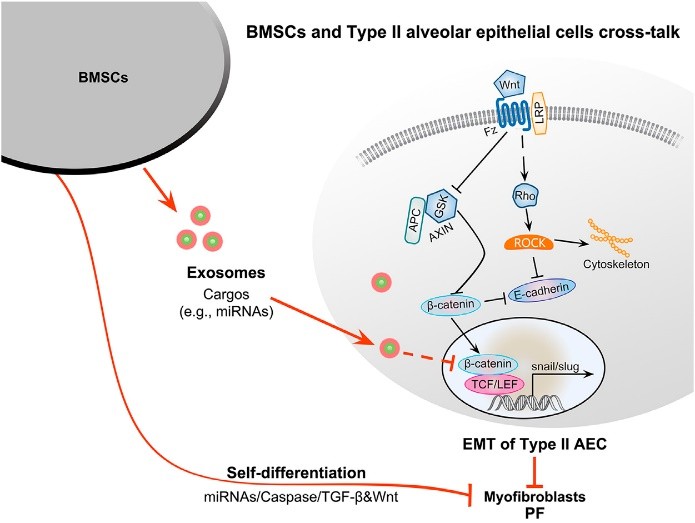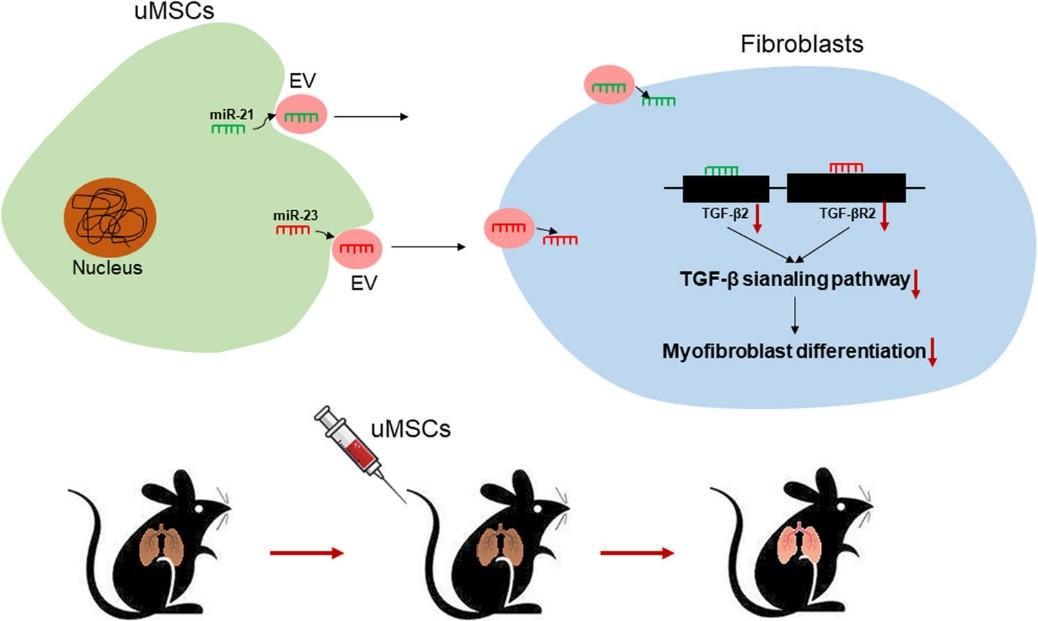Therapeutic Exosomes for Pulmonary Fibrosis
Pulmonary fibrosis (PF) is a type of disease with a very poor prognosis that seriously affects the quality of life of patients. A variety of cell-derived exosomes have been found to reduce fibrosis. Creative Biolabs has been committed to providing customers with one-stop services of engineered exosomes and is willing to work with customers to explore exosome drugs for the treatment of PF.
Pathogenesis of Pulmonary Fibrosis (PF)
PF is a fatal and incurable interstitial lung disease. The occurrence of PF is mainly due to the repeated injury of endothelial cells or alveolar epithelium caused by exogenous or endogenous factors, which activates the coagulation cascade, resulting in the release of various cytokines and growth factors. These factors recruit immune cells and infiltrate tissues, ultimately activating alveolar epithelial cells to differentiate into myofibroblasts and secrete excess collagen fibers through epithelial-mesenchymal transition (EMT). When collagen (fibrosis) builds up in the delicate gas-exchange air sacs (alveoli) of the lungs, it causes the lungs to become increasingly stiff and smaller. This eventually leads to low oxygen levels in the blood. PF seriously affects human respiratory function, manifested as dry cough and progressive dyspnea. And with the aggravation of the disease and lung damage, the patient's respiratory function continued to deteriorate. The incidence and mortality of PF are increasing year by year. Among them, the average life expectancy after diagnosis of idiopathic pulmonary fibrosis (IPF) is 3 to 5 years. Studies have found that bone marrow mesenchymal stem cells (BMSCs) in the PF microenvironment can promote the formation of myofibroblasts through self-differentiation and secrete exosomes to promote EMT of type II alveolar epithelial cells, thereby promoting PF.
Therapeutic Exosomes for PF
With the development of medical technology, the average survival age of PF patients has gradually increased. In clinical practice, hormones are mainly used to treat PF, but hormone therapy can only improve symptoms and delay the development of the disease. Although preclinical studies have demonstrated the efficacy of stem cells in PF, the instability of stem cells increases the risk of tumorigenicity and immunogenicity. Mesenchymal stem cell-derived extracellular vesicles (MSC-EVs) are natural and efficient transport vehicles. As a membrane structure, MSC-EVs have the advantages of low immunogenicity, a long half-life, good in vivo stability, and high delivery efficiency. MSC-EVs therapy is a new type of acellular biological therapy that is safer and more effective than stem cell therapy. BMSCs from healthy individuals can secrete exosomes to suppress EMT in type II alveolar epithelial cells to suppress PF. Furthermore, miR-21 and miR-23, which are highly enriched in extracellular vesicles of umbilical cord-derived mesenchymal stem cells (uMSC-EVs), have been shown to inhibit myofibroblast differentiation by inhibiting the expression levels of TGF-β2 and TGF-βR2 to further alleviate PF.
 Fig.1 Therapeutic potential of BMSC-derived exosomes for PF and the potential molecular mechanisms.1,3
Fig.1 Therapeutic potential of BMSC-derived exosomes for PF and the potential molecular mechanisms.1,3
 Fig.2 uMSC-EVs alleviated pulmonary fibrosis by inhibiting myofibroblast differentiation.2,3
Fig.2 uMSC-EVs alleviated pulmonary fibrosis by inhibiting myofibroblast differentiation.2,3
Nebulizer inhalation therapy is the use of a nebulizer to disperse the drug into tiny droplets or particles, and the particles are inhaled into the respiratory tract by the body to achieve a therapeutic effect. Atomized drug delivery has the characteristics of high safety, strong local action, and small side effects, and has great application prospects in the treatment of respiratory diseases. In mouse and rat models of pulmonary fibrosis induced by silica and bleomycin, respectively, lung spheroid cells - secreted exosomes and other factors could be delivered by aerosol inhalation to reduce damaged pulmonary fibrotic tissue and collagen deposition. The inhaled exosomes have been approved by the FDA (Food and Drug Administration) for Phase I clinical trials.
Creative Biolabs has extensive experience in exosome extraction and loading. Our customized services include consulting and research, exosome isolation, exosome loading, and functional validation in disease models. You are welcome to leave your thoughts and needs for treating PF on the website to contact us.
References
-
Xie, L.; Zeng, Y. Therapeutic Potential of Exosomes in Pulmonary Fibrosis. Frontiers Pharmacology. 2020, 11:590972.
-
Shi, L.; et al. Extracellular vesicles derived from umbilical cord mesenchymal stromal cells alleviate pulmonary fibrosis by means of transforming growth factor-β signaling inhibition. Stem Cell Research and Therapy. 2021, 12(1):230.
-
under Open Access license CC BY 4.0, without modification.
For Research Use Only. Cannot be used by patients.
Related Services:

 Fig.1 Therapeutic potential of BMSC-derived exosomes for PF and the potential molecular mechanisms.1,3
Fig.1 Therapeutic potential of BMSC-derived exosomes for PF and the potential molecular mechanisms.1,3
 Fig.2 uMSC-EVs alleviated pulmonary fibrosis by inhibiting myofibroblast differentiation.2,3
Fig.2 uMSC-EVs alleviated pulmonary fibrosis by inhibiting myofibroblast differentiation.2,3









